

It is usually defined and measured by the strength of the elderly's existing social network and the attributes of the person and organisations providing support to him or her through this network. Those who are socially isolated are people who have been identified with the absence or weakness of the social support network (Berg & Cassells, 1992).
Effects of social isolation on the elderly's development include:
- Higher risks for a variety of physical and mental health conditions
- Memory decline
- Lower social satisfaction levels.
Social Isolation Among Older Individuals: The Relationship to Mortality and Morbidity - The Second Fifty Years - NCBI Bookshelf. PHYSICAL DEVELOPMENT: HEALTH EFFECTS OF SOCIAL ISOLATION. Social isolation, loneliness in older people pose health risks. Human beings are social creatures.
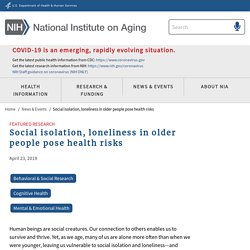
Our connection to others enables us to survive and thrive. Yet, as we age, many of us are alone more often than when we were younger, leaving us vulnerable to social isolation and loneliness—and related health problems such as cognitive decline, depression, and heart disease. Fortunately, there are ways to counteract these negative effects. Loneliness and Social Isolation Linked to Serious Health Conditions. Social isolation was associated with about a 50% increased risk of dementia and other serious medical conditions.
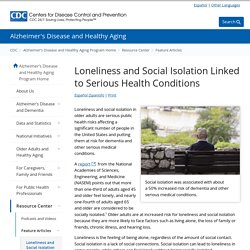
Loneliness and social isolation in older adults are serious public health risks affecting a significant number of people in the United States and putting them at risk for dementia and other serious medical conditions. A new reportexternal icon from the National Academies of Sciences, Engineering, and Medicine (NASEM) points out that more than one-third of adults aged 45 and older feel lonely, and nearly one-fourth of adults aged 65 and older are considered to be socially isolated.1 Older adults are at increased risk for loneliness and social isolation because they are more likely to face factors such as living alone, the loss of family or friends, chronic illness, and hearing loss. COGNITIVE DEVELOPMENT: MEMORY DECLINE. Social Isolation and Memory Decline in Later-life. Skip to Main Content Advertisement Search Close Advanced Search Search Menu Article Navigation Volume 75 Issue 2 February 2020 Article Contents.
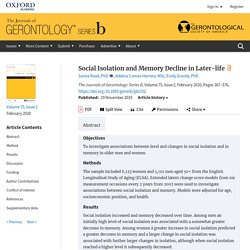
Isolation During Quarantine May Worsen Brain Health. Bonakdarpour says some patients grew confused or paranoid, including one who “thought the TV anchor they were watching was in the room with them.
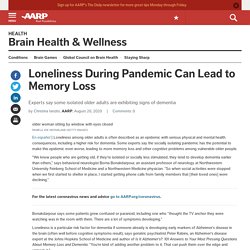
There are a lot of symptoms developing.” Loneliness is a particular risk factor for dementia if someone already is developing early markers of Alzheimer's disease in the brain (often well before cognitive symptoms result), says geriatric psychiatrist Peter Rabins, an Alzheimer's disease expert at the Johns Hopkins School of Medicine and author of Is It Alzheimer's?
: 101 Answers to Your Most Pressing Questions About Memory Loss and Dementia. “You're kind of adding another problem to it. That can push them over the edge and unmask it. " Rampant loneliness predates pandemic The repercussions are serious: Loneliness has been associated with a wide range of physical ailments, from high blood pressure to diabetes, as well as a weakened immune system — not something anyone wants to experience during a pandemic. SOCIAL DEVELOPMENT: LOWER SOCIAL SATISFACTION LEVELS. Seniors felt less socially satisfied, more isolated during Covid-19 circuit breaker period: Survey, Singapore News. SINGAPORE - Social isolation during the circuit breaker period resulted in lower social satisfaction levels for senior citizens, according to results from a monthly survey of about 7,500 people aged between 55 and 75 here. Social satisfaction levels dipped by about 4 per cent in May when compared with data from January.
In particular, for senior citizens living with others, satisfaction levels fell to the pre-circuit breaker levels of peers living alone, while those living alone saw even lower satisfaction levels as safe distancing measures made it more difficult to find support from friends and the community. As of July, while satisfaction levels have rebounded after the circuit breaker period, which was from April 7 to June 1, they are not back to the levels they were at before.
As Singapore's population ages, the proportion of those who remain single and live alone will increase, said Prof Straughan, a sociologist and former Nominated Member of Parliament. Relationship between elderly and younger family members deteriorating during Covid-19 lockdown: Survey. More than half of elderly people feel that their health is deteriorating and their relationship with family members, particularly with their sons and daughters, have further deteriorated during the Covid-19 lockdown, a survey has claimed.
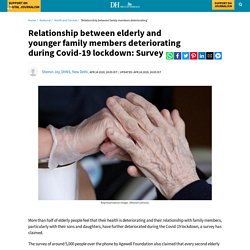
The survey of around 5,000 people over the phone by Agewell Foundation also claimed that every second elderly person was of the view that they are being mistreated, harassed, shouted at, threatened, neglected isolated or marginalised. Also Read: Coronavirus India update: State-wise total number of confirmed cases Around 55% feel that that current lockdown situation is affecting their health condition adversely while 75% said that they missed the "healing touch of their doctor" while 43% have to avoid regular pathological check-ups all of a sudden.
Among those surveyed, 54% are staying with their younger family members while 33% were living with their spouse and 13% were living all alone during the lockdown period. Track live updates on coronavirus here.